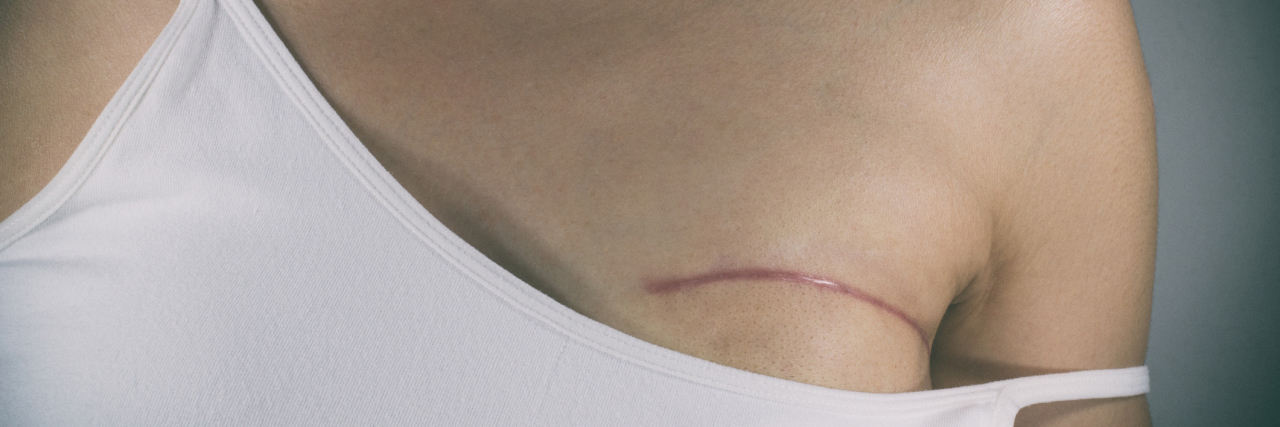I never thought in a million years I would have breast cancer. My breasts have never been extraordinary. They’ve always been small and I spent years wishing they were bigger and “better.” They’re so ordinary, I thought breast cancer would ignore them altogether. Faced with the possibility of losing them, all I wanted to do was keep them — my unexceptional, boring boobs. While I waited for my biopsy results, I thought maybe everything would be OK and I wouldn’t have to be mad at my breast for betraying me.
I stared at my right breast in the bathroom mirror. It looked like my regular, old breast. Nothing looked wrong. I didn’t feel different, other than being really tired, which honestly, wasn’t new. How could there be cancer when I couldn’t see it? It’s like the depression I live with — it’s invisible, so people don’t understand what I’m going through because I smile and pretend everything is OK. But it’s not.
I covered my breasts with my hands and imagined what the new landscape of my body would be. I searched the internet for pictures of women who elected not to have reconstructive surgery after mastectomies. I saw the most beautiful tattoos over scars, not to hide them, but to reclaim a part of them that was gone a testament of their survival and spirit. I saw pictures of women smiling and fearlessly showing the world that losing their breasts may have changed their bodies, but it didn’t take away their beauty, resilience and strength.
Before I had cancer, I would say I would definitely have a mastectomy. It’s easy to say things like that when it’s just make-believe — when you don’t have to agonize over a decision that will forever change your body and how you see yourself, or worry that your partner will see you differently and the intimate moments between you will disappear. I tested my husband. Will you love me without breasts? Yes. Will you love me with scars? Yes. Will you still find me beautiful and desirable? Yes. And then I wondered if what he said was true, not because he wasn’t honest, but because it wasn’t real.
We met with the surgeon and he told me something that was incredible to hear. He told me that whatever decision I made, it was the right decision for me. There was no wrong answer. It was my choice. I could have a mastectomy or a lumpectomy with radiation. I thought about a mastectomy, but when it was time to say it aloud, I couldn’t do it. It’s the right choice for a lot of women, but it was a choice I wasn’t ready to make.
My surgeon told me there was a chance I would have to have additional surgery depending on what they found. I would cross that bridge when and if I had to. Luckily, I never came upon it.
The cancer wasn’t aggressive, and it wasn’t in my lymph nodes. I had stage 1 invasive ductal carcinoma. I completed my radiation treatments, started taking a selective estrogen receptor modulator (SERM), and went on with my life.
I still look at my right breast in the mirror. It doesn’t look the same. I stare at my scars to remind myself of my strength.
My cancer survival story has a soundtrack. The lyrics to two Blue October songs became my mantra — Justin Furstenfeld sang the words I felt. The lyrics to “I Want It” plays over and over in my head when I look in the mirror:
Live for the moment and the mystery of everybody owns a scar
To show us how we got this far
Cause we are who we are and we’ll be who we’ll be
Don’t ever think you’ll take away the fight in me.
The lyrics to “Fear” changed how I saw my anxiety and gave me strength during my cancer journey:
‘Cause fear in itself
Will reel you in and spit you out
Over and over again
Believe in yourself
And you will walk
Now, fear in itself
Will use you up and break you down
Like you were never enough
Yeah, I used to fall, now I get back up.
Breast cancer may have knocked me down, but it couldn’t keep me down. My scars are the map of my journey. When I look at them, I see those who loved and supported me; the medical professionals who saved me; not only my strength, but the strength of my family; and my survival story. My body looks different, and I’m different, too. I’m better.
Follow this journey on the author’s blog.

